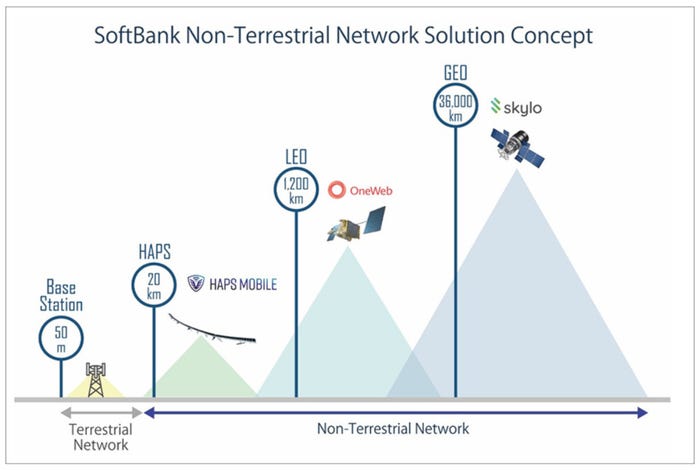Softbank takes to the crowded skies for coverageSoftbank takes to the crowded skies for coverage
Softbank has become the latest major telco to look at providing connectivity from space, announcing a raft of initiatives to broaden access to communications networks.
June 9, 2021

Softbank has become the latest major telco to look at providing connectivity from space, announcing a raft of initiatives to broaden access to communications networks.
There’s nothing brand spanking new in the Japanese operator’s announcement; it’s more a coming together of its existing satellite communications offerings. But it’s significant because it signals a serious push in the area of satellite-based communications at a time when competition in the skies is hotting up.
Domestic rival NTT unveiled its plan to launch data centres in space just a couple of weeks ago, while the likes of SpaceX, OneWeb – the latter being part-owned by Softbank – and others are launching thousands of Low Earth Orbit (LEO) satellites in a race to provide connectivity to difficult-to-reach areas. The skies are getting very crowded and Softbank is setting itself up to be a major figure in that crowd.
Specifically, Softbank is looking to use its various satellite capabilities to extend connectivity, with a focus on businesses, although there will be benefits for consumers too.
“To digitalize and transform analogue industries without access to communication networks, Softbank will aim to provide advanced and seamless connectivity services and Digital Transformation (DX) solutions in Japan and around the world,” the telco said.
Its portfolio includes recent partner Skylo, a Geosynchronous Earth Orbiting (GEO) satellite firm which provides NB-IoT connectivity and services to industries like fishing, mining and shipping, and OneWeb, the UK-based LEO satellite service that will focus on providing communications services to governments, businesses and consumers; the pair offer lower cost and lower latency options respectively compared with traditional GEO services, Softbank said.
It also runs HAPSMobile, which is building a High Altitude Platform Station (HAPS)-based stratospheric telecommunication platform to allow it to provide LTE and 5G services direct to consumers, including in regions lacking tradition mobile infrastructure.
“There are still many analogue industries around the world that lack sufficient access to communication networks. Providing Internet access is the first step to digitally transform these industries, and we believe our NTN solutions will be extremely effective technologies to achieve this goal,” said Hidebumi Kitahara, VP at SoftBank Corp and Head of the Technology Unit’s Global Business Strategy Division.
“With our NTN solutions powered by Skylo, OneWeb and HAPSMobile, we’ll work to offer telecommunication networks globally,” he said.

“At the end of the day, customers just want seamless connectivity — we’re finally able to do that at price points and at a form factor that has eliminated the historical disparity in addressable market size between users of terrestrial and non-terrestrial networks,” added Skylo CEO and co-founder Parth Trivedi.
Trivedi’s comment illustrates why the satellite sector has become so hot of late. Satellite has always been there in the background as a connectivity option for difficult-to-reach areas, but the industry was stifled by high costs and equipment constraints. Technology has moved on and now satellite is a valid option, so naturally there is a lot of interest in getting into the market now, just as Softbank is clearly seeking to do.
About the Author
You May Also Like










.png?width=300&auto=webp&quality=80&disable=upscale)


_1.jpg?width=300&auto=webp&quality=80&disable=upscale)